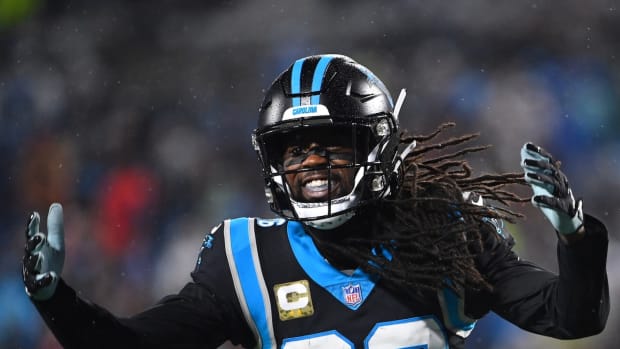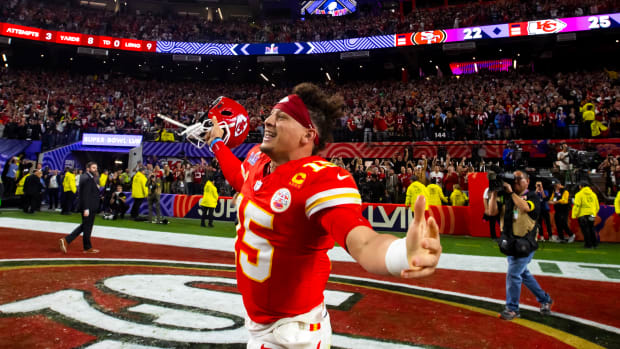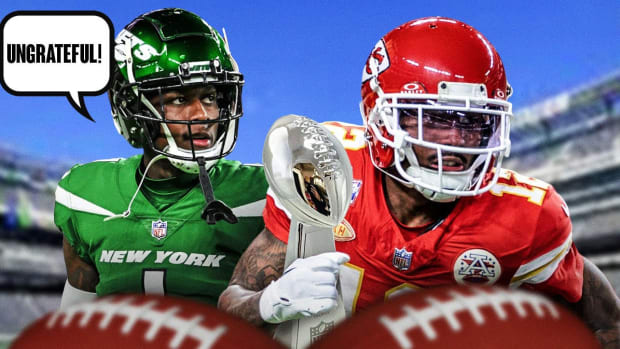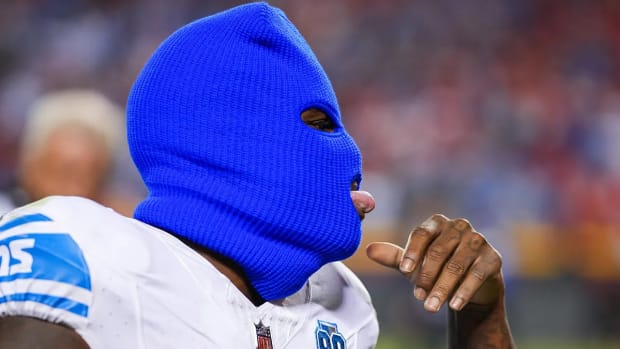How Jim Schwartz and Bill Belichick Are More Alike Than It May Seem
MINNEAPOLIS — In the 2010 offseason, Bill Belichick took some of his Patriots staff on a road trip to Allen Park, Mich. It was unofficial, unreported and extremely unusual. But Belichick, who famously does not like wasting a minute of his workday, knew exactly what he was doing.
The NFL’s scheduling rotation pitted AFC East teams against NFC North teams that season. Belichick wanted Lions coaches to share information and insights on the Packers, Vikings and Bears. In exchange, the normally guarded Patriots staff would share what they knew about the Jets, Dolphins and Bills.
College coaches often visit staffs from other conferences. In the smaller NFL, where everybody plays each other eventually, it is basically unheard of. But Belichick believed the Lions’ staff could tell him what film study could not. He believed that because their head coach was Jim Schwartz.
This week, as Belichick tries to win his sixth Super Bowl, Schwartz, now the Eagles’ defensive coordinator, is in position to stop him. Belichick says, “I can’t say enough good things about Jim Schwartz, He’s one of the smartest people I know.”
Belichick gave Schwartz his first NFL job, as a personnel scout with the Browns. The two men never coached together—Schwartz did not become an NFL coach until the Browns fired Belichick and moved to Baltimore. Yet Belichick’s beliefs shaped Schwartz’s, which means, in a roundabout way, that Belichick’s influence helped shape the defense that he faces this weekend.
The reserved Belichick and fiery Schwartz are more alike than they seem. Belichick is the league’s most prominent convention-defier; Schwartz is a veteran myth-buster. He’ll point out that a sack on third-and-long is only marginally more valuable than forcing an incompletion, bringing the value of the sack statistic into question. He was into analytics before people were supposed to be into analytics.
Schwartz, like Belichick, has mastered the great schematic challenge of NFL coaching: He makes the game seem simple to his players, but complicated to the opponent.
When Schwartz arrived in Philadelphia before last season, he told his coaches, “I want that playbook to be as small as we can possibly make it.” The team’s defensive alignments don’t vary that much. But Belichick taught Schwartz the value of versatile players; Schwartz’s favorite word may be “multidimensional.” All four safeties on the Eagles roster have also played cornerback, making them valuable pieces on the chessboard. Schwartz says: “We look for multidimensional. We don’t have anybody that’s strictly a pass rusher and we don’t have anybody that’s strictly a run-stopper.”
How Nick Foles's Crazy Senior Season of High School Football Shaped Him as a Player
Multidimensional players allow Schwartz to make subtle changes with radical results. A cornerback blitzes, effectively making him a defensive end. A defensive lineman drops into coverage. The rest of the defense remains basically the same, allowing players to play fast. But to a quarterback, it looks like it is constantly changing.
“It’s kind of like being at In-N-Out,” Eagles defensive line coach Chris Wilson says. “They don’t sell hot dogs. We sell Double Doubles, and if that’s what you want, come on over. We can get you Animal Style. We can get you lots of different options."
Adaptability is the key to long-term success in the NFL. When Schwartz first became a defensive coordinator, with Tennessee in 2001, he called a lot of blitzes. By 2008, his last year with the Titans, he rarely called any. His ability to adjust to both his personnel and game situations made him one of the hottest assistant coaches in the game. Every defensive coach makes adjustments at halftime; Schwartz sees the game so well and processes it so quickly, that he can adjust after every series.
Schwartz’s intellect made him an NFL head coach at age 43. His belief in it left him unemployed at 48.
Schwartz’s tenure in Detroit looked a lot like Belichick’s tenure in Cleveland:
Brilliant young defensive coach takes over struggling organization, leads team to playoffs, then regresses. His personality grates on people. Some call him arrogant. Others still swear by him. He gets fired and has to wait for another chance.
The Lions went 0-16 the year before Schwartz showed up, and his swagger was like an injection of adrenaline. He knew it.
“We needed to build a bully,” says Jeremiah Washburn, Schwartz’s offensive line coach in Detroit. “We had to play edgy. This was a team that was 0-16.”
Schwartz’s Lions lost 24 of their first 28 games, surprising nobody. The roster he inherited was barren, and quarterback Matthew Stafford struggled to stay healthy. But in December of his second season, Schwartz tried the kind of psychological trick that only a truly charismatic leader can pull off. He told his 2-10 team to imagine that their last four games were for a playoff spot. They had to win all four to get in.
For the Eagles to Beat the Patriots in Super Bowl 52, They Must First Not Beat Themselves
They won all four. It was reminiscent of what Bill Parcells’s first Patriots team did; in 1993 they started 1-11, then won their last four. The next year, as the Lions were fighting for a real playoff spot, Schwartz told them: We did this last year. Remember?
They made the playoffs. Stafford was 23. All-Pro receiver Calvin Johnson was 26. Schwartz was 45. The next decade looked pretty good. Schwartz knew that, too.
Schwartz certainly did not get less sure of himself after making the playoffs, and his swagger spilled over into something messy—a passionate, but undisciplined team that committed dumb penalties and turned the ball over. The Lions went 4-12 in Schwartz’s fourth season.
Washburn says of Schwartz’s coaches: “We would have all taken a bullet for him.” But not everybody in the organization felt that way. He was not shy about letting people know how smart he was. He could be condescending with the media. Some players grumbled that he treated stars differently than everybody else.
Privately, Schwartz knew he had to make some changes after that 4-12 season. His next team was more disciplined than his previous ones. But the line between successful coaches and failed ones is thinner than we often realize—one or two poor decisions can doom a tenure, and one or two unfortunate breaks can doom a win-or-get-fired season.
Schwartz started spending considerably more time with the defense, perhaps because he had such faith in Stafford, Johnson and offensive coordinator Scott Linehan. It backfired, as Stafford continued to make critical errors. The Lions started 6-3, but they finished 7-9 and Schwartz was fired.
At the time, it seemed like Schwartz’s cockiness finally got him. But a series of bizarre circumstances did not help. Running back Jahvid Best lost his career to concussions after just 22 games. Receiver Nate Burleson broke his arm when he tried to save a pizza box from slipping and crashed his car. They lost to the Ravens on a 61-yard field goal and to the Giants in overtime.
“I think about that all the time,” Washburn says. “It was just a few things here and there. We could have and should have won the division.”
Coaches on the 2013 Lions have a hard time letting that season go. They believed they were on the cusp of something great. They still do. In Detroit, assistant coaches would walk past Schwartz’s office at 11 p.m., planning to go home. Schwartz would pull them into a conversation about football philosophy, invariably teaching them something new about the game. Yes, that sounds a lot like Bill Belichick in Cleveland.
The Schwartz who met with the media several times this week seems slightly different from the one in Detroit. He is still obviously brilliant and engaging. But he did not bristle as often. He seems more like the guy that Eagles defensive coaches say is not just a boss, but a friend. And since he is only 51, it makes you wonder what will happen if gets a chance to be a head coach again.
Belichick sealed his reputation as a defensive guru in Super Bowl XXVI, when the Giants, with backup quarterback Jeff Hostetler, stymied the favored K-Gun Buffalo Bills led by Jim Kelly and Thurman Thomas. Schwartz has a similar chance here, as defensive coordinator of a team bringing a backup quarterback against a heavy favorite with a star quarterback.
Trey Burton Is Super Bowl 52’s Most Likely Unlikely Hero
If the Eagles win this game against Tom Brady, Schwartz could be the big name in next year’s coaching market. I asked Schwartz what he learned from his tenure in Detroit. He said he is always learning, always trying to get better: “That’s what life is all about. Whether you’re a player, a coach, a writer, it’s along journey.” He did not get specific.
“Aren’t you writing better stories than you did five years ago?” he asked.
“That depends who you ask,” I said.
“Probably a lot like me,” he said.
There are those who are skeptical that Schwartz is a bit humbler now. This may explain why he did not get a job this go-round, despite taking the Lions to the playoffs and being one of the league’s best assistant coaches. Only Schwartz really knows if he has changed. He doesn’t have to change a lot. Just enough.
His old center in Detroit, Dominic Raiola, says, “He still coaches with that edge. I think if he’s in the spotlight again, there probably won’t be what you guys call arrogance.” Washburn says Schwartz actually made the tweaks he needed to make before the Lions fired him, resulting in a more disciplined team, but Detroit’s 2013 season fell apart at the end anyway. Washburn says: “The right job is out there for him. He is going to get the right job and absolutely kill it.”
The Eagles’ defensive players will take the field in this Super Bowl believing that their coach has all the answers. Maybe Jim Schwartz has acted like the smartest man in the room sometimes. But Bill Belichick flew from Massachusetts to Michigan just to be in that room.




































